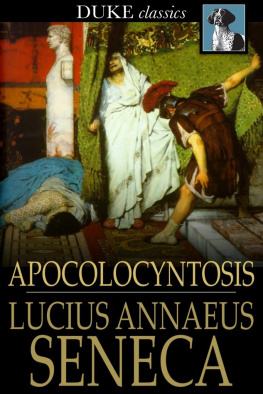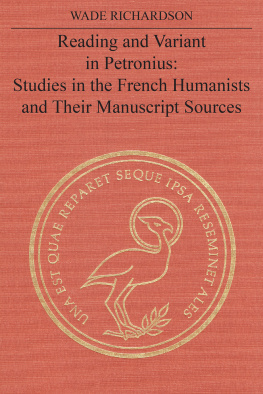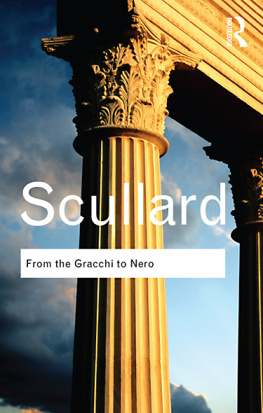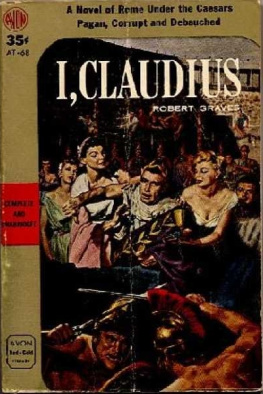J. P. SULLIVAN held appointments in Classics or Arts and Letters at the Universities of Oxford, Cambridge, Texas, Buffalo, Minnesota and Hawaii. His last position was as Chair and Professor of Classics at the University of California, Santa Barbara. He wrote The Satyricon of Petronius: A Literary Study, Propertius: A Critical Introduction, Literature and Politics in the Age of Nero and Martial: The Unexpected Classic. He also edited, with A. J. Boyle, Roman Poets of the Early Empire and Martial in English for Penguin Classics. John Sullivan died in April 1993.
PETRONIUS THE SATYRICON AND SENECA THE APOCOLOCYNTOSIS
Revised edition
TRANSLATED
WITH INTRODUCTIONS AND NOTES BY
J. P. SULLIVAN
PENGUIN BOOKS
PENGUIN BOOKS
Published by the Penguin Group
Penguin Books Ltd, 80 Strand, London WC2R 0RL, England
Penguin Putnam Inc., 375 Hudson Street, New York, New York 10014, USA
Penguin Books Australia Ltd, 250 Camberwell Road, Camberwell, Victoria 3124, Australia
Penguin Books Canada Ltd, 10 Alcorn Avenue, Toronto, Ontario, Canada M4V 3B2
Penguin Books India (P) Ltd, 11 Community Centre, Panchsheel Park, New Delhi 110 017, India
Penguin Books (NZ) Ltd, Cnr Rosedale and Airborne Roads, Albany, Auckland, New Zealand
Penguin Books (South Africa) (Pty) Ltd, 24 Sturdee Avenue, Rosebank 2196, South Africa
Penguin Books Ltd, Registered Offices: 80 Strand, London WC2R 0RL, England
www.penguin.com
This translation of The Satyricon published 1965
Reprinted with revisions 1969
Reprinted with revisions 1974
Reprinted with The Apocolocyntosis 1977
Revised Edition 1986
28
This translation of The Apocolocyntosis first published
in the United States of America in Arion, University of Texas, 1966
Copyright J. P. Sullivan, 1965, 1969, 1974, 1977, 1986
All rights reserved
Except in the United States of America, this book is sold subject to the condition that it shall not, by way of trade or otherwise, be lent, re-sold, hired out, or otherwise circulated without the publishers prior consent in any form of binding or cover other than that in which it is published and without a similar condition including this condition being imposed on the subsequent purchaser
IN MEMORIAM
BETTY RADICE
CONTENTS
PETRONIUS
INTRODUCTION
The Authorship and Date of the Satyricon
The Satyricon has been traditionally, and rightly, attributed to the courtier of Nero whose downfall and death in A.D. 66 are described by Tacitus (Annals 16.1720):
17. So the space of a few days saw the fall, in the same bloody action, of Annaeus Mela, Cerialis Anicius, Rufrius Crispinus, and Petronius, Mela and Crispinus being Roman knights of senatorial status
18. Gaius Petronius deserves a further brief notice. He spent his days sleeping and his nights working and enjoying himself. Industry is the usual foundation of success, but with him it was idleness. Unlike most people who throw away their money in dissipation, he was not regarded as an extravagant sensualist, but as one who made luxury a fine art. His conversation and his way of life were unconventional with a certain air of nonchalance, and they charmed people all the more by seeming so unstudied. Yet as proconsul in Bithynia and later as consul, he showed himself a vigorous and capable administrator. His subsequent return to his old habits, whether this was real or apparent, led to his admission to the small circle of Neros intimates, as his Arbiter of Elegance. In the end Neros jaded appetite regarded nothing as enjoyable or refined unless Petronius had given his sanction to it. Consequently the jealousy of Tigellinus was aroused against him: he saw in Petronius a rival, someone superior to himself in the whole art of pleasure. So he worked upon the Emperors cruelty, his master-passion, to which all his other lusts were subordinate. Accusing Petronius of being an intimate of Scaevinus, he bribed a slave to give evidence against him. Petronius did not have a chance to reply and Tigellinus threw most of his household into prison.
19. The Emperor at that time happened to be on a visit to Campania. Petronius got as far as Cumae and was prevented from going any further. He refused to prolong the suspense that hope or fear involved. Not that he was hasty in taking leave of his life. On the contrary, he opened his veins and then, as the fancy took him, he bound them up or re-opened them, and all the while talked with his friends, but not on serious topics or anything calculated to win admiration for his courage. He listened to their contributions not discussions about the immortality of the soul or the opinions of philosophers, but simply gay songs and light verses. He dealt out rewards to some of his slaves and floggings to others. He began a lavish dinner and took a nap, so that his death, although forced on him, should appear natural. Even in the codicils to his will, unlike most of the victims, he refused to flatter Nero or Tigellinus or anyone else powerful. Instead he wrote out a full description of the Emperors vicious activities, giving the names of his male and female partners, and specifying the novel forms his lust had taken. This document he sent under seal to Nero. Then he broke his signet ring in case it should be used later to endanger others.
20. Neros puzzlement as to how his nocturnal ingenuities were known was resolved by blaming Silia. This was a not insignificant person, a senators wife, in fact, who had been a chosen partner in all the Emperors vices and also a close friend of Petronius. She was exiled, an example of personal hatred, for her lack of discretion about what she had seen and experienced.
Plutarch, in his essay On the Distinction Between Flattery and Friendship (60 d-e), adds an anecdote which may throw some light on Petronius character and the methods by which he retained for a time his position with Nero:
These are minor faults. Next, however, comes that unscrupulous practice which has such a damaging effect on silly people. This consists in accusing them of tendencies and weaknesses the very opposite of their real failings This may take the form of sneering at reckless and extravagant spenders for their petty-minded and sordid ways Titus Petronius did this with Nero.








